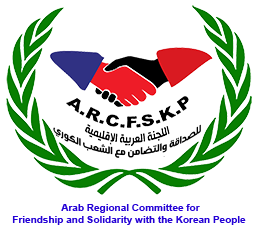Farsighted Leadership of Comrade KIM IL SUNG and Comrade KIM JONG IL, great leaders of the Korean people in the anti-imperialist, anti-US Struggle to firmly defend peace and security of the Korean Peninsula and of rest of the world
Farsighted Leadership of Comrade KIM IL SUNG and Comrade KIM JONG IL, great leaders of the Korean people in the anti-imperialist, anti-US Struggle to firmly defend peace and security of the Korean Peninsula and of rest of the world
It is my privilege to participate in an on-line forum titled “International Forum in support of the Just Struggle of the Korean people for safeguarding of Sovereignty and Peace” organized by the Arab Committee for Friendship and Solidarity with the Korean People (ACFSKP) under the joint auspices of the Regional Committees for Friendship and Solidarity with the Korean people to mark the June 25-July-27 Anti-US Joint struggle Month.
All the independent, progressive and peace-loving nations of the world are celebrating “Month of Anti-US Joint Struggle with the Korean people after the fourth Afro-Asian People’s Solidarity meeting held in Ghana in May, 1965 declared to celebrate it and expressing solidarity with the Korean people’s just struggle to build a strong and prosperous socialist nation in the world.
While celebrating June 25- July 27 the month of solidarity and anti-US joint struggle with the Korean people, we reiterate our full support to the Korean people in their struggle for gloriously enhancing the anti-imperialist cause of independence and for consistently safeguarding peace and security of the world. It is also a unanimous desire and will of the progressive mankind of the world to build an impartial and peaceful world free from any kind of belligerence, supression and war.
As we all know June 25 is the day of Korean War provoked by the US 74 years ago. The United States attempted to invade the Democratic People’s republic of Korea for long time to hold over the Korea for its frontline to dominate the Asia and world. The US aggression on Korea spans more than 150 years. The disturbance of the US ship “General Sherman” into River Taedong in mid-August 1866 was its start. The Americans who had interrupted as far as to the vicinity of the walled city of Pyongyang along the river aboard the “General Sherman”, murdered Koreans and stripped them of their property, raining bullets and shells upon them, far from acceding to the demand of the Korean side for their immediate getting out of Korea. Irritated at this, people of Pyongyang sent the ship to the bottom of the river by a clever piece of fire attack tactics.
Instead of drawing lesson from this incident, US kept pursuing the aggression policy on DPRK and as soon as Japan met with defeat in World War II took illegally the south Korea by force in the name of the “disarming the Japanese troops”. To dominate whole Korea, it made preparation in high spirits for five years for Korean war which broke out on June 25 1950.
The US committed to the war one-third of its ground force, one fifth of its air force and the greater part of its Pacific Fleet and tried to defeat at an attack the people’s Korea which had a history of only 2 years, but the heroic people of DPRK, who rock-like united around the great leader Supreme Commander Comrade KIM IL SUNG defeated, the US who possessed the “strongest” in the world on July 27, 1953.
The U.S. hostile policy towards the DPRK has long been a contentious issue, raising significant concerns about its potential to escalate into a broader conflict. This adversarial stance, characterized by military posturing, stringent economic sanctions, and diplomatic isolation, poses several dangers to regional and global stability.
Firstly, the persistent military tension on the Korean Peninsula creates a perilous environment. The U.S. maintains a robust military presence in South Korea and frequently conducts joint military exercises, which the DPRK views as rehearsals for invasion. This perceived threat has driven North Korea to prioritize its military capabilities, including the development of nuclear weapons and ballistic missiles. The resulting arms race increases the risk of miscalculation and unintended conflict.
Economic sanctions, another pillar of U.S. policy, have devastating effects on the North Korean populace while doing little to alter the regime’s behavior. These sanctions contribute to severe humanitarian crises, exacerbating food shortages, limiting access to essential medical supplies, and impeding economic development. The resulting suffering can foster deep-seated resentment towards the U.S., potentially radicalizing a new generation against American interests.
Diplomatic isolation further entrenches the DPRK’s defensive posture. The lack of open communication channels increases the risk of misunderstandings and reduces opportunities for de-escalation. Historically, periods of heightened diplomacy, such as the 2018-2019 summits, have shown promise in reducing tensions. However, the return to a hostile stance undermines these efforts, eroding trust and making future negotiations more challenging.
Moreover, the U.S. policy has broader implications for international relations. It complicates the dynamics between major powers like China and Russia, both of whom have strategic interests in the Korean Peninsula. The U.S. approach can push these countries to support North Korea more robustly, further polarizing global politics and complicating efforts for a unified response to the DPRK’s actions.
The dangerousness of the U.S. hostile policy towards DPR Korea lies in its potential to provoke military conflict, exacerbate humanitarian crises, hinder diplomatic solutions, and destabilize international relations. A shift towards engagement, dialogue, and gradual normalization of relations, while challenging, may offer a more sustainable path to peace and stability on the Korean Peninsula.
On this auspicious occasion of the International Solidarity Month with the Struggle of the Korean People (June 25 – July 27), representatives of the social, friendship, solidarity and journalists organizations of Nepal, recall with deep emotion how more than seven decades ago, in the Fatherland Liberation War, the heroic Korean people showed to the whole world that however small a country is, its people, conscious of its just cause, can unitedly fight and defend its independence, dignity and sovereignty.
While keenly watching the present deteriorating situation in the Korean Peninsula specially caused by the imperialist forces worries the world which strongly in the favor of solving the unjust and hostile approach of the imperialist forces towards the DPRK and solve entire issues by the peaceful means sitting on the table, but not through the unjust adoption of “resolution on strong sanctions” against the sovereign nation.
On this auspicious occasion, we warmly greet and congratulate the Heroic Korean people and their Supreme Leader His Excellency KIM JONG UN, President of the State Affairs of the DPRK, Chairman of the Workers’ Party of Korea and Supreme Commander of the Armed Forces of the DPRK and wish Him good health and long life to lead the Korean people’s just struggle and to achieve the final victory of the Korean revolution and for the lasting peace in Korea, which is also the desire of the whole progressive and peace-loving people of the world for Your Excellency’s revolutionary Songun leadership for all victories and magnificence of the DPRK against the imperialist blueprint to suppress the dear socialism of the DPRK.
PR Pant
- Secretariat Member of the Asian Regional Committee for Friendship and
Solidarity with Korean People
- General -Secretary, Nepal Korea Friendship Association
Kathmandu,
13th July, 2024




